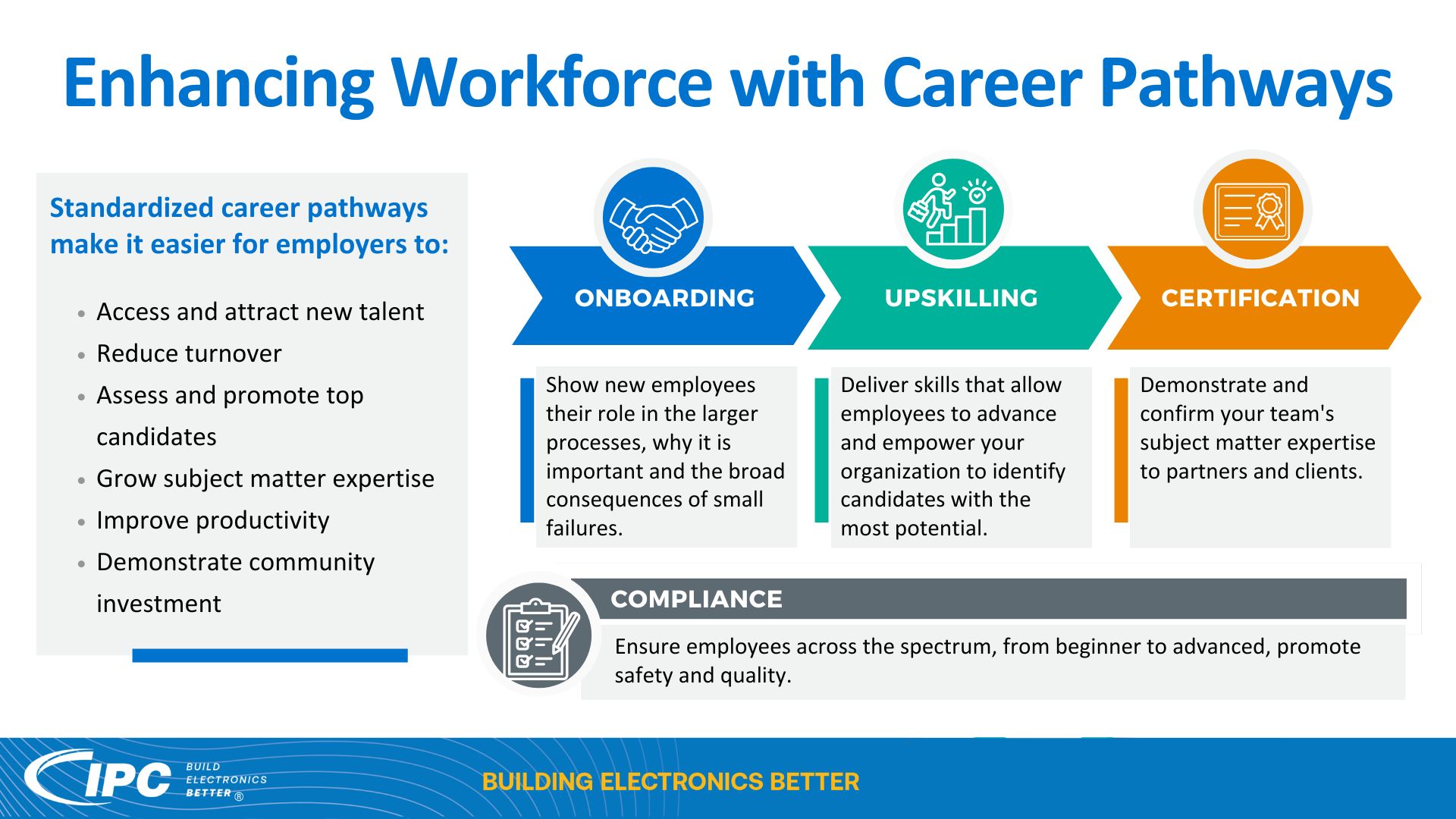How Standardized Career Pathways Alleviate Workforce Challenges
Building a strong workforce means attracting, retaining, and nurturing qualified workers. To achieve these lofty goals, understanding what motivates talent is a must. And career advancement is key.
According to a 2022 McKinsey study, a lack of career development and advancement was the most common reason for leaving a job. Conversely, companies that make career advancement pathways visible reap the benefits. A recent LinkedIn study found that a whopping 94% of employees said they would stay longer at a company that invested in their career. That might explain why companies with a strong learning culture have 2X employee retention rates. And that matters because replacing employees is costly: the median cost of turnover is roughly 21 percent of an employee’s annual salary.
The fact is that workers want to grow, thrive, and advance their careers so they can do more and earn more. Those who join the electronics manufacturing industry are seeking opportunities for development. It’s up to the industry to ensure they understand the expectations and opportunities available and communicate a clear vision of how careers are supported, enhanced, and advanced. Establishing transparent and standardized career pathways will enable employees to visualize a clear path for advancement within the industry.
Developing and expanding standardized career pathways is one part of IPCs comprehensive plan to address the complex workforce challenges encountered by the electronics manufacturing industry. (We have discussed the importance of establishing an industry-driven talent pipeline and upcoming posts will cover other key elements of our extensive plan.) Clearly defined pathways foster the mutual growth and success of both employees and employers.
What is a standardized career pathway?
A standardized career pathway is a roadmap that provides workers with a clear route to career growth. It shows the steps they need to take to progress from entry-level positions to more advanced roles. These pathways should include all essential roles and clearly outline the required education levels, training, certification, and work experience needed for advancement. This involves mapping out onboarding, upskilling, compliance, and certification levels to illustrate how competencies lead to more advanced roles. It also involves ensuring workers have access to the resources necessary for their growth.
How do standardized career pathways benefit employers?
For employers, career pathways are a gift that keeps giving. They provide a clear picture for employees, helping them visualize a successful career within an organization. This empowers employers to:
- Access and attract new talent
- Reduce turnover
- Assess and promote top candidates
- Grow subject matter expertise
- Improve productivity
- Demonstrate community investment
What is IPC doing about it?
IPC has been working closely with experts across the industry to identify and map the competencies required to perform key roles such as operator, technician, and engineer. The goal is to make career paths transparent and accessible, ensuring that workers can easily understand the steps required to progress in their careers. The steps needed to move from assembly operator to inspector to trainer shouldn’t be shrouded in mystery. When career advancement is unclear, it discourages workers from aspiring to new roles, ultimately disadvantaging both employers and employees.
IPC also creates, curates, and aligns resources to help employers and employees take full advantage of career pathways. IPC resources are designed to be accessible and adaptable, accommodating the unique needs of each organization. Many organizations have their own secret sauce, a singular approach to culture and quality that makes them unique. Employers can tailor IPC onboarding, compliance, upskilling, and certification programs—as well as IPC’s apprenticeship programs—to complement their distinct internal strategies.
How can I learn more?
Industry-wide career pathways are essential to ensuring that the electronics manufacturing industry has the skilled labor it needs to grow and prosper. Clearly defined career pathways make it easier for academic institutions to train students according to the industry’s needs. They empower employers to attract, retain, and grow their workforce, and allow workers to envision a successful future in the industry. To learn more about IPCs plan, download our whitepaper, Building Electronics Better: A Plan to Address the Workforce Challenges Facing the Electronics Manufacturing Industry, today.

